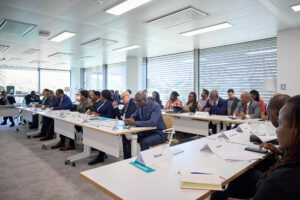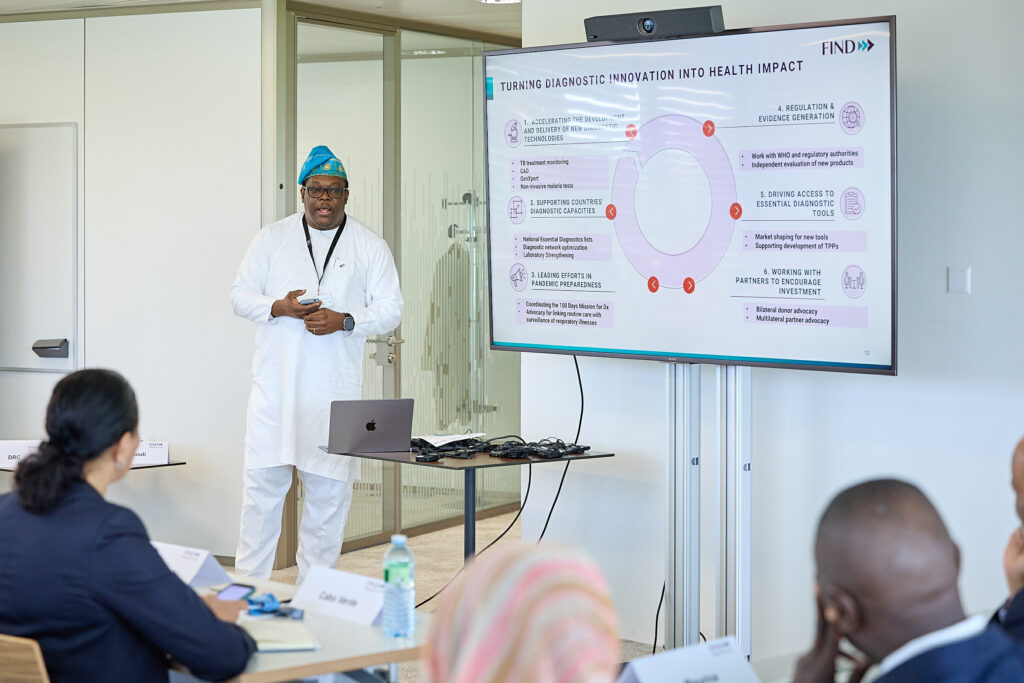In order to improve diagnostic systems and get ready for potential health and pandemic risks, FIND’s leadership presented its updated strategic vision as a precursor to this year’s Diagnostics Day event to be held on 21 May.
As part of its continuing outreach to the parts of the world that it was set up to serve, FIND (www.FINDdx.org) hosted Ambassadors from 26 African countries and the African Union for a meeting at FIND’s offices in the Global Health Campus in Geneva. The Ambassadors received an overview of FIND’s work in their respective countries, future prospects and were made aware of FIND as a value-added partner for countries with respect to diagnostics.
“The foundation of any successful health response is diagnosis. From early detection to pandemic preparedness, our collaboration with the African Union is essential to guaranteeing that no one is left behind,” said Dr. Ifedayo Adetifa, CEO of FIND. “FIND’s vision is focused on both catalyzing innovation and ensuring access to diagnostics in low- and middle-income countries.”
In order to improve diagnostic systems and get ready for potential health and pandemic risks, FIND’s leadership presented its updated strategic vision as a precursor to this year’s Diagnostics Day event to be held on 21 May, which will take place on the sidelines of the World Health Assembly.
” FIND will continue to support them on strengthening pandemic preparedness and ensuring quality diagnostics are available to all “.
The ambassadors of the African Union, Angola, Burkina Faso, Cabo Verde, Cameroon, Central African Republic, Chad, Côte d’Ivoire, Democratic Republic of Congo, Kenya, Lesotho, Madagascar, Malawi, Mauritania, Mauritius, Mozambique, Namibia, Rwanda, Sao Tomé and Principe, Sierra Leone, South Africa, South Sudan, Sudan, Tanzania, The Gambia, Togo, and Zimbabwe were present.

The Ambassadors led a lively discussion which touched upon a number of key issues, including South-South collaboration; pandemic preparedness and response; the role of health in national development; national essential diagnostics lists; the growing issue of non-communicable diseases such as diabetes; and ensuring sustainable financing for diagnostics and health in general.
Among the meeting’s main conclusions were:
- Commitment to strengthen regional manufacturing of diagnostics and other health technologies.
- Consensus on increased AU-FIND cooperation to country and Africa CDC’s diagnostic priorities.
- Support for FIND’s function as a technical partner to expand access to vital diagnostics for illnesses like HIV, TB, malaria, mpox and emerging outbreaks.
- Diagnostics acknowledged as a key component of health security and universal health coverage.
“In this moment of dramatic change, African leaders are stepping up to fill the power vacuum left by a world in turmoil where women and children are being left behind and left to die, particularly on the African continent – the continent with the greatest health burden,” said Dr Ayoade Alakija, FIND’s Board Chair. “FIND will continue to support them on strengthening pandemic preparedness and ensuring quality diagnostics are available to all.”
FIND’s Diagostics Day (https://apo-opa.co/44AX9pc) event on 21 May at the Vieux Bois in Geneva will bring leaders from health from around the world to agree on next steps to ensuring quality and accessible diagnostics for all.







OTHER ARTICLES
Editorial — Prevent, inform, and act for women’s health in Africa
Kenya : Government Prioritises Maternal Health and Strengthens Support for Community Health Promoters
Strengthening pandemic prevention, preparedness, and response capacities in Senegal using the “One Health” approach